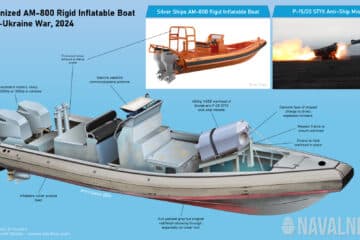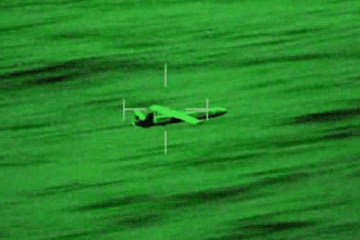Story by TASS Russian news agency
Experts believe drone engagement for sea target reconnaissance is effective in long patrols, the Izvestia daily writes.
Naval Forpost will operate together with aircraft to destroy sea targets, Defense Ministry sources said. During a snap check of the Southern and Western Military District in July the drones detected and identified in the Black Sea a group of warships and provided guidance to naval aviation. Su-24M bombers and Su-30SM fighter jets delivered a precision strike.
The Defense Ministry reported in April that Forpost trained interaction with submarines. Black Sea fleet drones detected warships and transmitted coordinates to the Kolpino diesel-electric submarine. It delivered a conditional strike with Kalibr missiles.
In May, Forpost of the Baltic fleet trained in Kaliningrad region to detect targets and adjust fire of naval artillery. The Defense Ministry said the drones transmitted target and fire information by digital channels in real time from an altitude of several kilometers. They helped the Soobrazitelny corvette to rapidly adjust fire.
“It is a very effective system. Modern equipment helps a reconnaissance drone transmit precise targets coordinates to aircraft in the air. They can be on duty in the air and the time from detection to destruction will radically decrease. Previously, a reconnaissance aircraft had to be sent to search for sea targets. The life of the crew was at risk. Modern drones can fly longer and their engagement is a step forward,” he said.
former Commander of the 4th air force and defense army Lieutenant-General Valery Gorbenko
Russian naval aviation chief Major-General Igor Kozhin said drones opened a new epoch in its development. They are used in reconnaissance, survey, control, and cargo delivery.
The Navy created the first drones units in 2013. They were deployed in Severomorsk and Kamchatka. In 2014-2015, the units were reformed into squadrons and subordinated to naval aviation bases. Drone units appeared in the Black Sea and Baltic fleets at the time.
Medium-range Forpost is the biggest serial drone in the Russian armed forces. The Aerospace Forces and the Navy operate several dozens of them. The drones have been produced by the Ural Civil Aviation Plant since 2014.
The drones are engaged to detect ground targets and adjust artillery and missile fire, as well as in humanitarian and monitoring missions.
Forpost was created on the basis of Israeli IAI Searcher II. Russia acquired the license in 2010. The drone weighs 450 kg and can fly for 18 hours. It is equipped with powerful optical reconnaissance means, transmitting and radio equipment.
In Syria, Forpost was engaged to detect targets and control strikes of naval aviation against terrorists, as well as to monitor the strikes of naval cruise missiles.
It was reported in 2019 that Forpost-R option was at the final stage of the design. It will be fully made of Russian components. The upgrade will improve characteristics and onboard equipment. Powerful optics will be supplemented by onboard radars to detect land and sea targets in any weather at a major distance, the Izvestia said.






